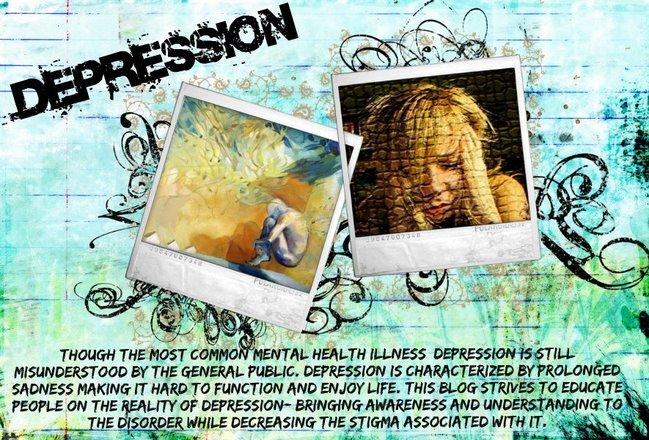
Depression, affecting more than 121 million worldwide, is one of the most common health conditions in the world. In the 19th century, people saw it as an inherited weakness of temperament associated with guilt and conflict. Depression isn't a weakness, nor is it something that you can simply "snap out of." It’s more than just a feeling of being “down in the dumps” or “blue” for a few days. Feeling down from time to time or sad in response to a medical condition, frustration, disappointment, or loss is normal. These feelings are described by many as “depression,” but they are just situational depression (a normal reaction to events around us).
Depression (a.k.a. major depression, dysthymic disorder, major depressive disorder, unipolar depression, or clinical depression) is a medical illness that involves the mind and body. It is distinguished from situational depression by length and severity. Clinical depression is thought to be caused by a combination of biological, psychological and social factors. It affects how you think and behave and can cause a variety of emotional and physical problems. A person with severe depression has little or no interest in work or hobbies, and may even have trouble getting out of bed. It interferes with a person’s ability to study, have fun, work, eat, and even sleep. Depression can even make a person feel as if life just isn't worth living anymore- accounting for 850,000 fatal suicides each year.

Clinical depression can run in families, and usually starts between the ages of 15 and 30. Depression is the leading cause of disability and the 4th leading contributor to the global burden of disease. It affects people of every color, race, economic status, or age. According to the Nemours Foundation, as many as 1 in 8 persons in their teen years are affected by depression, and women are more affected than men. Symptoms can include:
- Feelings of helplessness and hopelessness: A bleak outlook—nothing will ever get better and there’s nothing you can do to improve your situation
- Loss of interest in daily activities: No interest in or ability to enjoy former hobbies, pastimes, social activities, or sex
- Appetite or weight changes: Significant weight loss or weight gain—a change of more than 5% of body weight in a month
- Sleep changes: Either insomnia, especially waking in the early hours of the morning, or oversleeping
- Psychomotor agitation or retardation: Either feeling “keyed up” and restless or sluggish and physically slowed down
- Loss of energy: Feeling fatigued and physically drained. Even small tasks are exhausting or take longer
- Self-loathing: Strong feelings of worthlessness or guilt. Harsh criticism of perceived faults and mistakes
- Concentration problems: Trouble focusing, making decisions, or remembering things

Depression can be reliably diagnosed and treated. The best treatment for most people is a combination of self-help strategies, professional help (antidepressants and psychotherapy), and lifestyle changes. Antidepressant medications along with psychotherapy are effective for 60-80% of those affected. What works for one person may not work for another. One treatment is not appropriate for all cases, so all options should be explored. According to the WHO, fewer than 25% of those affected have access to effective treatments (in some countries fewer than 10%). Barriers to effective care include lack of trained providers, lack of resources, and the social stigma associated with depression and other mental health disorders. The risk of developing depression can be reduced by knowing the risk factors and making lifestyle changes. Risk factors include:
- Genetics: If you have family members who have suffered from depression, you may have a greater risk of developing depression yourself, although there is currently no direct gene that has been found to cause depression
- Early childhood trauma or abuse: Emotional trauma and abuse has a powerful effect on the psyche. If you had traumatic early life experiences, you may be more at risk to develop depression during or after a stressful life event
- Loneliness and lack of social support: A key risk factor for depression is isolation and loneliness. Lack of support, whether it is family, friends or colleagues, makes coping with stress all the more difficult. Having marital and relationship problems can also make you feel alone and frustrated
- Recent stressful or traumatic life experiences: Some events, like losing a loved one, are clearly stressful and cause enormous disruption and strain in our lives. However, anything that causes change can be a stressful life experience, even if it is normally considered a happy event such as a big work promotion, a wedding or childbirth
- Alcohol and drugs: Alcohol and drugs can cause strong depression symptoms on their own. They can also make you more vulnerable to depression even if you decide to stop using them. Some people try to treat themselves with alcohol and drugs to self medicate, but this only worsens the problem
- Finances and employment: Financial strain can be an enormous stressor. Struggling to pay the bills or mortgage, or suddenly becoming unemployed, is a very stressful life event. Being unemployed can be a blow to self confidence and can be a very difficult adjustment, especially for men
- Health problems or chronic pain: Health problems and chronic pain may reduce your mobility, your ability to work or your spare time. They can chip away at supportive relationships and make you feel hopeless and frustrated
